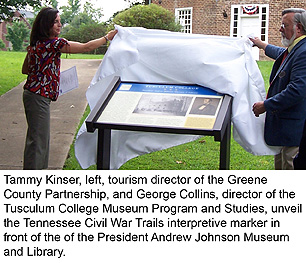 Six Tennessee Civil War Trails signs were unveiled Tuesday in Greene County, beginning with a ceremony at the marker at the President Andrew Johnson Museum and Library on the Tusculum College campus.
Six Tennessee Civil War Trails signs were unveiled Tuesday in Greene County, beginning with a ceremony at the marker at the President Andrew Johnson Museum and Library on the Tusculum College campus.
Greene County has the second largest number of the Civil War Trails signs in the state. “You may not have the most, but you have the most important ones,” said Dr. Van West, executive director of the Tennessee Civil War National Heritage Area, during the ceremony.
State and local officials and state legislators participated in the ceremony, celebrating the culmination of the initial part of the initiative, a local tourism project of the Greene County Partnership. The Civil War Trails is a multi-state program that identifies, interprets and creates driving tours of both the great campaigns and lesser known Civil War sites with sites designated with interpretive markers.
“It is really important what happened here about 150 years ago,” West said. “When you think about the total Civil War period, it began here and ended here.” The important Greeneville Convention before the war was a microcosm of the struggles that the nation was facing, he continued, and some of the most significant early fighting of the war involves the story of “unbelievable bravery” by Union sympathizers who burned bridges along the rail lines in the western part of the county.
“The story represented by the building behind us over here (the President Andrew Johnson Museum and Library) of President Johnson represents the end of the Civil War,” West said. “The reconstruction presidency of Andrew Johnson was central to the redefinition of citizenship and redefinition of the sense of nationalism after the tragedy of war.”
Dave Jones, representing the Tennessee Department of Tourist Development, said, “What is unique about the Civil War Trails is they tell the Civil War stories that have not been told. We know about the big stories, but this is an opportunity for the local community to tell you stories and bring tourism to your county.”
George Collins, director of the Tusculum College Museum Program and Studies, spoke to some of that history, noting that the “Old College” building that houses the President Andrew Johnson Museum and Library is the oldest academic building on the Tusculum College campus. It was built in 1841 for $4,500 through in-kind service and donations. One of those donations was $20 (equivalent to six months in wages at the time) from Andrew Johnson, who also served as a trustee of the college.
“Although our county, state and nation are diverse, we are linked by our common history,” Collins said. “We are honored to be a part of the Civil War Trails.”
The Civil War Trails marker at the President Andrew Johnson Museum tells of the College’s experiences during the War. The other Civil War Trails markers in Greene County tell about the Pottertown Bridge Burners, the battles of Blue Springs, the Bridge Burners’ hanging near the railroad depot in Greeneville, the Dickson-Williams Mansion and the death of Gen. John Hunt Morgan.
The benefits of tourism were noted by State Sen. Steve Southerland R-Morristown, who is chairman of the Senate’s Tourism Committee. Many people do not realize that the second largest industry in the state is tourism, and it generates about $14 billion a year in the state, he said. Other speakers noted that Civil War tourists spend more on average than other types of tourists.
State Representative David Hawk R-5th noted that Greene County is a leader in tourism in the state. Earlier in the ceremony, Collins had thanked Hawk particularly for his efforts in securing a state Community Enhancement Grant to provide funds for the project.
State Representative Eddie Yokley D-11th, said he was pleased to be attending the unveiling as there were some in the legislature who opposed the program. Fortunately, he said, the program received support and will play an important role in exposing not only tourists but also the local community to history.
Greene County has been a leader in the Tennessee Civil War Trails project as the first meeting in the state about the initiative was held here. Locally, the effort was spearheaded through the Greene County Partnership and involved a citizens committee to work towards installing the signs in Greene County.
This is a beginning for the Civil War Trails efforts in Greene County, noted Tammy Kinser, tourism director at the Partnership, as a 14-mile bike trail in Mosheim has been identified through the efforts of Donahue Bible, a local historian who has worked for years to bring greater public awareness of the story of the “bridge burners” and their significance to the Civil War.
Kinser said there are many people to thank for the success of the project including the Tennessee Department of Transportation, Governor Phil Bredeson, Tennessee Tourism Commissioner Susan Whittaker, Mitch Bowman of the Civil War Trails organization, Dr. Van West, the local Civil War Trails Committee, the Greene County Commission, the Andrew Johnson Bicentennial Committee, the Town of Mosheim, the Town of Greeneville, the City of Tusculum, Food Country, Tim Massey of Morgan’s Men, Greene County Heritage Trust, Cindy Lucas, Claudia Moody of the Northeast Tennessee Tourism Association and Russell and Sheila Ooten for providing a Greene Coach bus for the tour of the sites that followed the ceremony.


